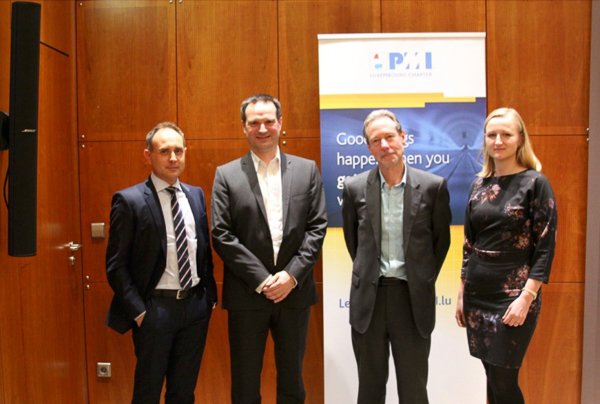
In view of the fact that 70% of organisational change management projects reportedly fail, the Project Management Institute hosted an event that aimed to find out why, and who is getting things right.
The event attracted more than 100 project managers, to hear the views of Ludovic Delépine, head of unit for the ICT Conception and Development Unit at the European Parliament, Ludwig Balmer, head of IT, and state personnel administrator, Anna Ciszek, change management leader at Goodyear, and Steve Quinn, head of business management investment funds services with Clearstream
According to PMI organisational change related projects are the fourth most common type of projects undertaken worldwide, whether they deal with installing new technologies, downsizing, restructuring, or trying to change corporate culture. Despite some individual successes, however, change remains difficult to pull off, and few companies manage the process as well as they would like.
Emphasising the need for taking control and mapping the direction of change management, and elaborating on the successful paradigm in European institution, Ludovic Delépine said “if you don’t drive change you enter into the circles of hell and abandon your hopes to quote Dante Alighieri.”
For large organisations, Mr Delépine found a useful and currently necessary tool in Business maps, a formal business framework aimed at describing how an organisation works at the highest description level.
Ludwig Balmer, presented the benefits of modelling frameworks, such as Prometa, for improving change outcomes and mitigating risks more effectively.
In the course of the ensuing panel discussion, the speakers agreed that the human factor is the most critical focus point. Anna Ciszek said “we need to understand human behaviors in order to make changes acceptable and adoptable and thus produce desired results”. In that connection, communication with all stakeholders is key.
The panel proposed a five-step approach for the successful management of cultural change projects:
- Strong support by senior leadership not only in words but in action since 70% of the success is dependent on them.
- Clarification of key desired people behaviours to drive change so people can visualise the desired manners.
- Focus not only on technical elements but on soft skills – “win the hearts of people”.
- Accountability of all hierarchical levels.
- One step at a time implementation to incorporate learnings as the projects goes on.
When the panel was asked about reasons why projects fail, they indicated the absence of clear rules for people to follow, the complexity of solutions proposed, the absenteeism of attention to the economies of the new system and the non-development of prototypes to gain support from the users.
Image: Ludvig Balmer, Ludovic Delépine, Steve Quinn, Anna Ciszek. Photo supplied








